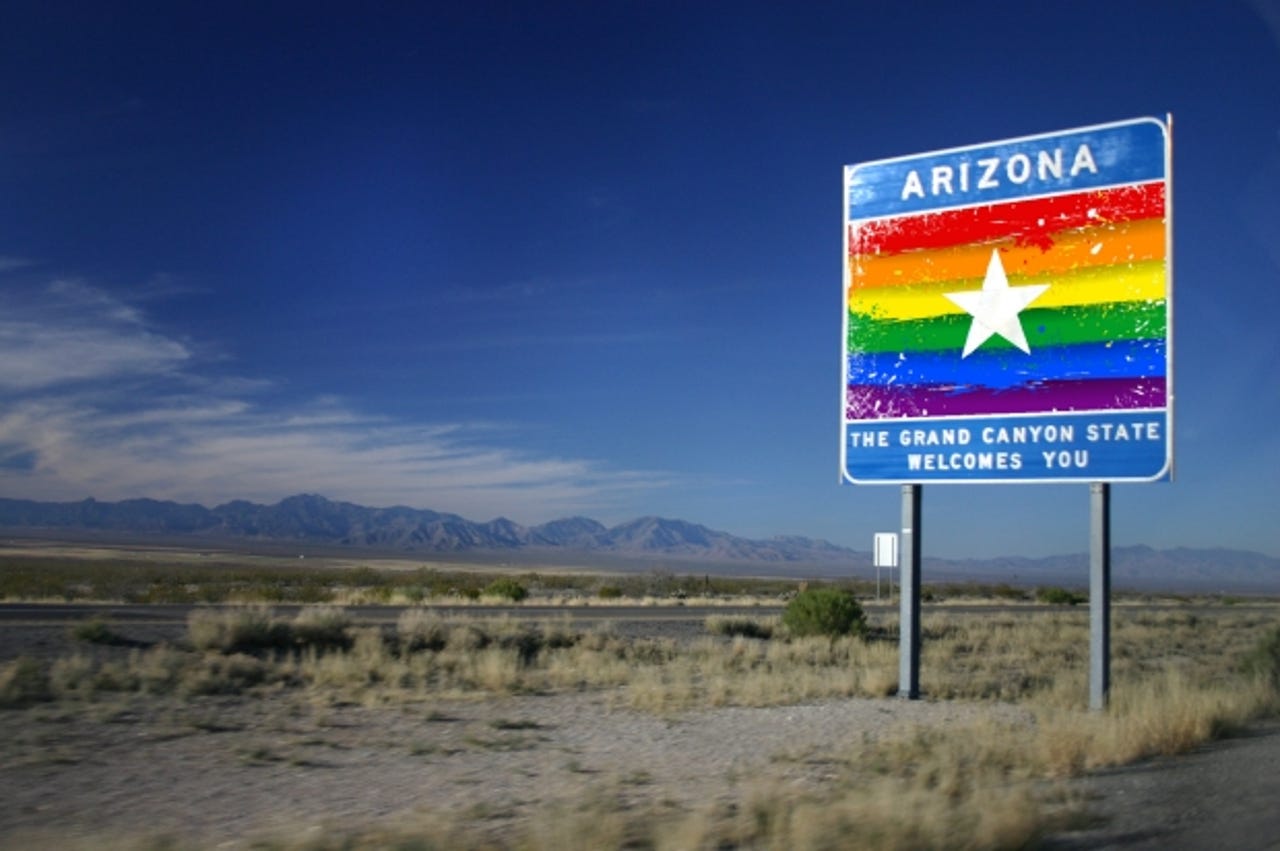Tech industry mounts pressure, threatens exodus over Arizona's proposed 'anti-gay' law


Arizona Governor Jan Brewer has until Friday to decide whether or not she will veto a bill that will not simply undermine, but entirely unravel the state's workplace anti-discrimination policies.
Arizona's state legislators delivered a bill, voted on by the Republican-controlled state Senate, and by the Republican-controlled state House.
Read this
Brewer has until Friday to actively intervene and veto the bill, or it becomes law.
The controversial bill, known as Arizona SB 1062, seeks to amend the state's existing laws in a vague and unpredictable way that would effectively allow individuals to refuse service so long as that decision is made solely on their personal religious beliefs.
The law amends the existing Religious Freedom Restoration Act, which would vastly expand the definition of a "person" beyond a "religious assembly or institution" to any individual, corporation, estate, trust, or any other legal entity.
It gives that expanded range of individuals and companies the "ability to act or refusal to act," so long as it was "in a manner substantially motivated by a religious belief."
Naturally, the first thing that comes to mind is the LGBT (lesbian, gay, bisexual and transgender) community. But it goes far beyond that.
The 6.5 million people living in Arizona are, by law, already permitted to discriminate against gay people because no such preventative legislation exists. But now this bill, if it becomes law, will allow a greater scope of people and companies to discriminate against someone due to their religious beliefs — which can now include anything from sexuality, nationality, skin color, marital status, or even gender.
It's no surprise, therefore, that major technology companies, including Apple, Intel, and Salesforce.com, have publicly declared their opposition — in some cases threatened an exodus — from the state in protest at the law, which they claim would have a "detrimental effect on the local business community by promoting discord and damaging Arizona's status as a hospitable place to grow business and attract top talent," according to Intel.
Microsoft in an email to ZDNet on Wednesday confirmed it "supports a veto" of the bill.
Apple confirmed earlier this week that a representative spoke to Brewer's spokesperson Andrew Wilder to throw its weight behind the growing army of opposition to the bill.
And, Salesforce chief executive Marc Benioff tweeted on Wednesday: "If this bill passes we will never do another corporate event in Arizona."
"If this bill passes we will never do another corporate event in Arizona." — Salesforce CEO Marc Benioff
It's worth noting dozens of other non-tech industry companies are also in favor of Brewer vetoing the bill, including American Airlines, McDonalds, and Target.
A list of companies urging Brewer to veto the bill can be found here.
Large and smaller companies have made a habit of intervening in legislative disputes and affairs, particularly over the past 20 years have fought hard for gay rights for their employees and partners. Not least last year, which saw a coalition of more than 200 companies urging the U.S. Supreme Court to overturn the controversial Defense of Marriage Act, which led to the legalization of same-sex marriages.
Their argument was simple. Arizona remains a crucial place for technology companies from chip-making and smartphone display facilities to research labs and datacenters. Hundreds of thousands of top talent from around the U.S. and the world work in the state to create some of the next-generation technologies that Arizona's congress-people will end up no doubt using in their computers and phones.
These businesses rely on all the vast array of people with dimensions of difference. We have a gay guy running Apple, one of the most popular technology companies in the world, and we have companies like Facebook that celebrate pride events. For crying out loud, we have a black guy in the highest office in the United States.
I'd honestly pay good money to see someone in Arizona refuse to serve the President because of their deep-rooted convictions that he's secretly a Muslim, or he wasn't actually born in a U.S. state, or because he too has come out in support of gay marriage.
And I'd certainly like to see Arizona Sen. Steve Yarbrough (R-17th) smash his iPhone on the pavement and switch to an Android phone because he might catch "gay cooties."
Featured
The bill becoming law will see tourism take a nose-dive, throttle innovation in the state, and people will leave for better places — and so will the companies.
Because by the very vague nature of this bill, it's entirely possible to drum up any religious sensibility and throw it back at someone who's different from you, in almost any way, shape and form.
Of course, this bill would vastly expand First Amendment of free speech. But those rights frankly go so beyond the line in the sand that the line is a mere dot on the horizon.
Let's not forget this was the state that had serious anti-immigration policies that allowed police to pick out a slightly brown or tanned person and rifle through their documentation to determine if they were in fact allowed to be in the state.
Academics and lawyers call that "racial profiling." But law enforcement does not like the term because it has negative connotations. One can't possibly imagine why.
For a country founded on the principles that the church and the state should remain separate, it's surprising to see how far religion has and continues to infiltrate the very hearts of our state and federal legislative systems.
Updated at 7:45 pm ET: with a statement from Microsoft.